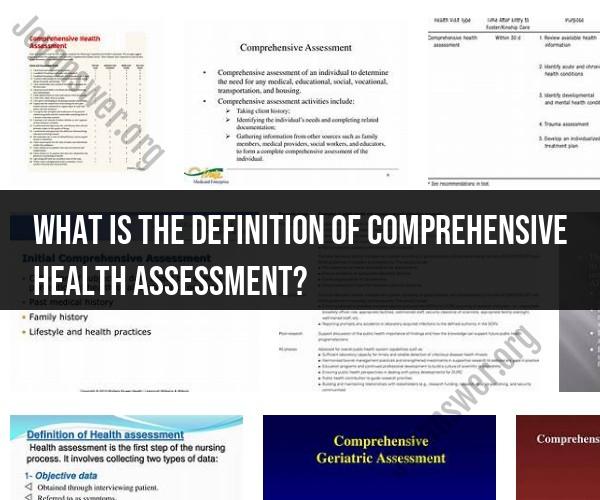What is the definition of comprehensive health assessment?
A comprehensive health assessment is a systematic and thorough evaluation of an individual's overall health status, including physical, mental, emotional, and social well-being. It is typically conducted by healthcare professionals, such as physicians, nurses, or nurse practitioners, and it serves several important purposes:
Diagnostic Evaluation: A comprehensive health assessment helps healthcare providers diagnose medical conditions, identify risk factors, and detect early signs of disease. It includes a review of the patient's medical history, current symptoms, and family medical history.
Health Promotion: It assesses a person's lifestyle, behaviors, and habits, including diet, exercise, smoking, alcohol consumption, and stress levels. This information helps in promoting healthy lifestyle changes and disease prevention.
Treatment Planning: Healthcare providers use the assessment to develop individualized treatment plans for patients. This may involve prescribing medications, recommending therapies, or suggesting lifestyle modifications.
Monitoring Chronic Conditions: For individuals with chronic illnesses, such as diabetes, hypertension, or asthma, regular comprehensive health assessments are crucial for monitoring the progress of the condition, adjusting treatment, and preventing complications.
Patient-Centered Care: Comprehensive health assessments take into account the patient's preferences, values, and goals, ensuring that the care plan aligns with the patient's needs and desires.
Early Detection: Early detection of health issues through comprehensive assessments can lead to earlier intervention and improved outcomes. This is especially important for conditions like cancer, where early diagnosis can be life-saving.
A typical comprehensive health assessment includes various components, such as:
Medical History: Reviewing the patient's personal medical history, family history, and any previous surgeries or treatments.
Physical Examination: A thorough physical examination, which may involve checking vital signs (blood pressure, heart rate, etc.), assessing organ systems, and looking for physical abnormalities.
Lifestyle Assessment: Evaluating the patient's lifestyle choices, including diet, physical activity, smoking habits, alcohol use, and substance abuse.
Mental and Emotional Health: Assessing the patient's mental and emotional well-being, including questions about stress, anxiety, depression, and overall mental health.
Medication Review: Reviewing the patient's current medications, including prescription and over-the-counter drugs, to check for interactions and adherence.
Immunization Status: Ensuring that the patient is up-to-date with recommended vaccinations.
Counseling and Education: Providing guidance, counseling, and education to the patient on health-related topics, preventive measures, and self-care strategies.
Screening Tests: Conducting various screening tests based on age, gender, and risk factors. These may include blood tests, cancer screenings, and other diagnostic tests.
A comprehensive health assessment is an essential part of preventive care and disease management, as it helps individuals and healthcare providers work together to maintain and improve overall health and well-being. It plays a significant role in the early detection of health issues and the development of personalized healthcare plans.












